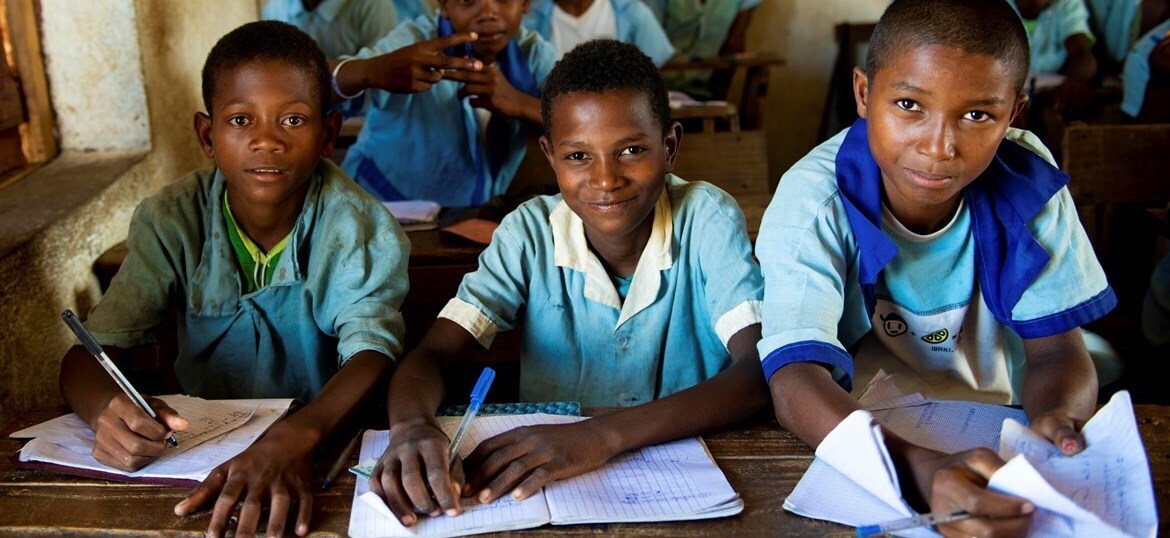
Funded
- About
Overview
Schools in Madagascar are severely inadequate, lacking both sufficient infrastructure and sanitation facilities. As a result, 60% of primary-age children do not attend school. Without help, children will continue to not receive the education they deserve.
Project Sekoly is SEED’s ongoing school construction project. It aims to improve health and education outcomes for children in rural communities of the Anosy region. Alongside school buildings, we construct rainwater harvesting systems, latrines, menstrual management facilities, and deliver water, sanitation, and hygiene (WASH) education sessions. We also aim to mitigate our environmental impact by offsetting our carbon footprint and establishing plantations for sustainable community harvest.
The Challenge
Madagascar’s education system is facing a crisis. Over 1.3 million primary-aged children are not enrolled in school, and the investment in infrastructure is declining. Prevalent illnesses stemming from poor WASH conditions kill 6,900 Malagasy children annually and further prevent school attendance. These challenges are amplified in Madagascar’s southeast Anosy region. In this isolated and impoverished area, half of 6-10-year-olds have never attended school, while a staggering 97% of the population lack access to basic sanitation.
Emagnevy Primary School exemplifies the Anosy region’s education and WASH challenges. The current school is isolated and desperately overcrowded, with only 5 classrooms and a storeroom to serve 350 students and 10 teachers. This means more than half of children attend half-school days, with cramped and broken benches. The school also lacks WASH facilities, with no access to handwashing and on-site water wells, only 2 latrines, and limited menstrual hygiene management facilities for girls. Teachers are underpaid and live up to a four-hour journey from the school, a commute that contributes to their absenteeism.
Whilst improving education and WASH infrastructure is crucial, SEED recognises that the construction of infrastructure contributes to an increase in carbon emissions, negatively affecting the environment. Vulnerable and economically underdeveloped regions, like Anosy, are disproportionately impacted by the effects of climate change. Therefore, SEED is committed to removing, reducing, and offsetting the carbon footprint of our operations and programmes, to move towards our long-term goal of net-zero carbon emissions.
Our solution: Project Sekoly
Project Sekoly has achieved significant success towards improving education for children in rural communities across southeast Madagascar. To achieve education and health outcomes at Emagnevy Primary School, this project will:
- Improve full-time school attendance through the construction of one building with two fully furnished classrooms.
- Improve teacher attendance through the provision of on-site housing.
- Improve access to and usage of clean water for all students and teachers annually through the construction of two rainwater harvesting systems.
- Improve gender-equitable sanitation for all students and teachers annually through the construction of three latrines and a menstrual hygiene management facility.
- Increase WASH knowledge and behaviours amongst students and teachers through the delivery of WASH lessons and the establishment of a school WASH committee.
Following project completion, the school and community will have the capacity to manage all infrastructure. A committee will be established and will receive training in infrastructure management, enabling them to respond to repairs and fund upkeep through the provision of surplus rainwater to the community.
To offset the carbon footprint of the project - caused by transport, construction, and materials - SEED will establish community-managed plantations where 251 trees will be grown over the next ten years. A mixed plantation approach will be implemented, in which an equal number of trees will be planted for carbon offsetting and sustainable community harvest. We believe that by planting trees to address local demand for resources, we also protect the trees planted for offsetting, ensuring they continue to grow and sequester carbon. The establishment, monitoring, and management of the plantation will be conducted in partnership with Emagnevy School, to develop local ownership of the scheme and build capacity for its sustainable management into the future.
Long-term impact
By creating a space in which rural children have access to a good education, WASH facilities and clean water we are both providing children with the fundamental knowledge they need to be able to flourish, as well as giving them hygiene education which will help to protect them from fatal diseases.


